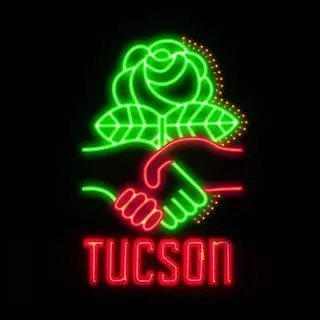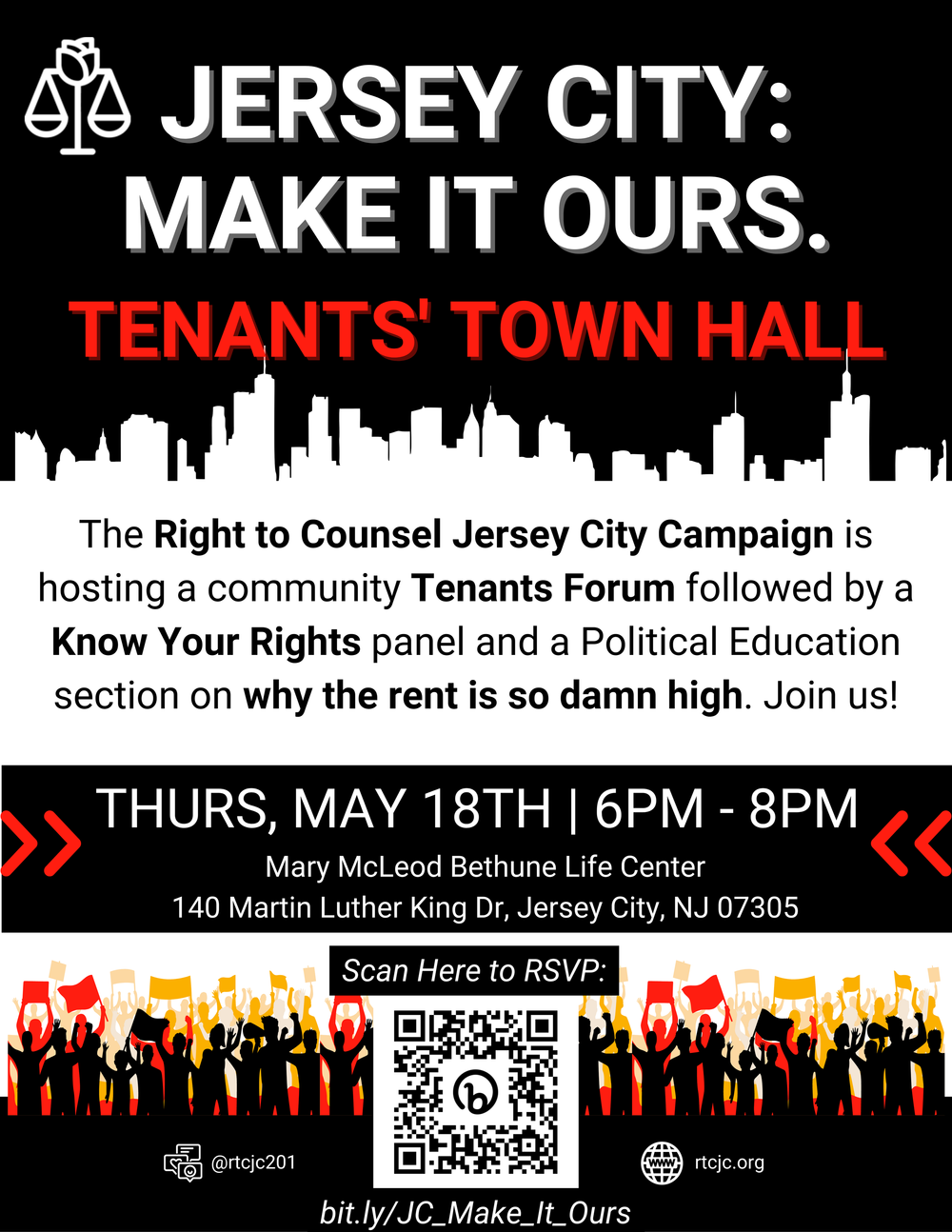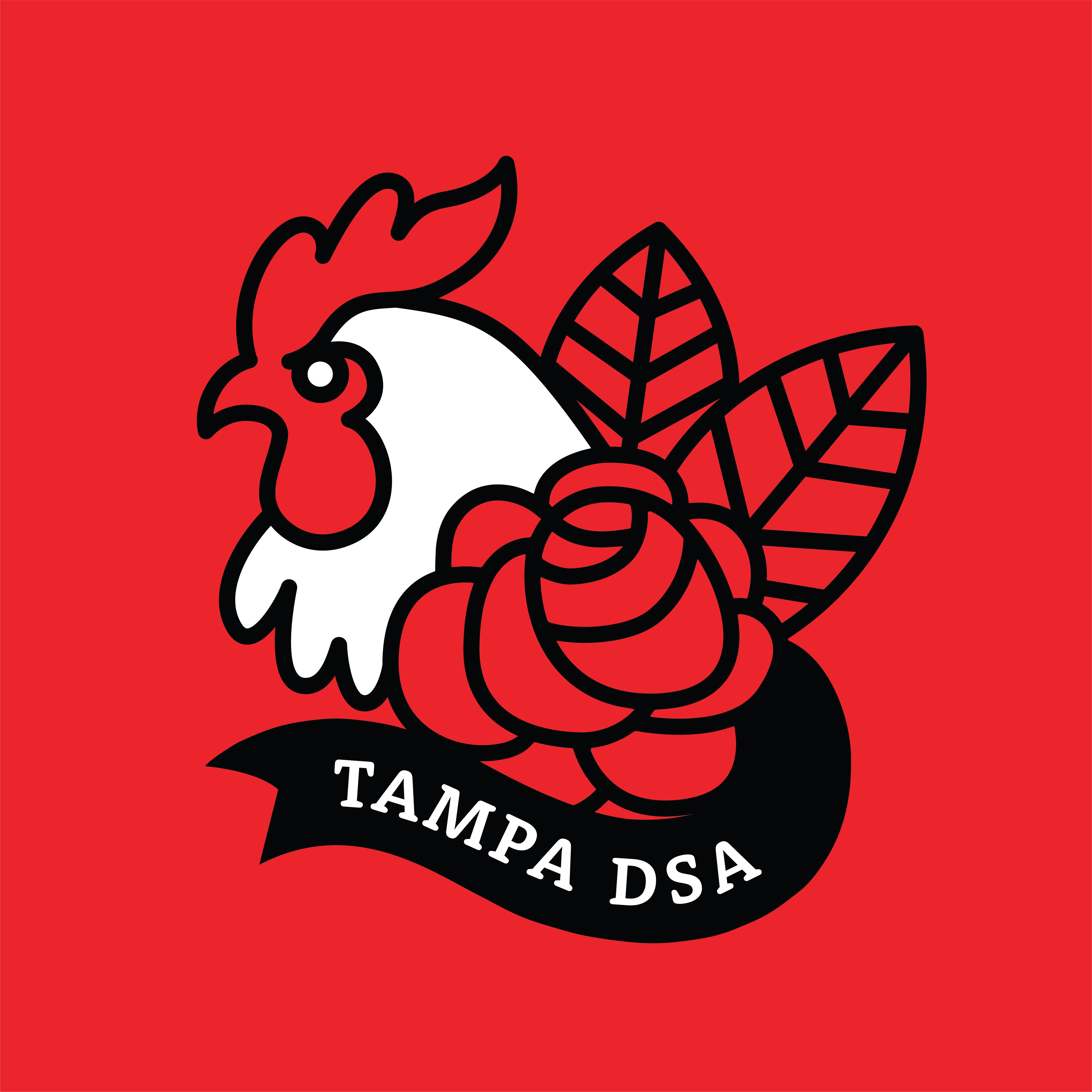

The Indypendent: The Long Struggle for Affordable Housing in New Jersey Dates Back to the Civil Rights Movement
“Just as Mount Laurel residents fought back 50 years ago, tenants in Jersey City are currently organizing against rising rents and evictions. The two right to counsel ordinances they are fighting for will give all tenants in Jersey City the right to free legal representation, create a right to counsel office in City Hall and introduce fees on developers to create an affordable housing fund. Part of that fund will be used to cover the costs of tenants’ legal services.”


HCV: Jersey City RTC advocates march to City Hall as council gets ready for vote
“Workers and tenants are fighting back in their unions in their tenancies with their neighbors and at City Hall. We’re not paying for right to counsel through taxpayers. We’re going to tax the rich. We’re funding right to counsel with a fee on development…Including the biggest developer in Jersey City, the LeFrak organization. LeFrak is the chief architect of Newport and the displacement of thousands of Jersey City residents that lived right here.”


Hop Shop Social - Tucson DSA
|


LETTER: The Jersey City Council must adopt Right to Counsel (RTC)
From longtime Greenville resident Hakim Hasan: RTC has the potential to protect vulnerable residents from housing injustices and provide them with the legal support they desperately need.
“For far too long, the landscape of Jersey City has been shaped by mega-landlords, developers, and real estate investors, resulting in an increasingly unaffordable city for its residents. Sadly, it is the poor and working-class individuals throughout our city who bear the brunt of exploitation by unscrupulous landlords. It is imperative that the Right-to-Counsel ordinance provides the necessary legal representation and advice to vulnerable families facing illegal evictions and habitability issues in their homes.
Supporting the Right-to-Counsel ordinance is an easy decision for me.”
Read “The Jersey City Council must adopt Right to Counsel (RTC)” in TAPinto Jersey City


HCV: Hudson County DSA hosts Town Hall about Jersey City’s Right to Counsel proposal
The Hudson County chapter of the Democratic Socialists of America (DSA) hosted a town hall at the Mary McCleod Bethune Center last night about Jersey City’s right to counsel proposal ahead of next week’s council meeting.
“Hudson County DSA has been campaigning for nearly a year for the law and have asked for a universal policy, immediate implementation, and protections for tenants with vouchers.”


Come to Jersey City: Make It Ours - Tenants Town Hall
Join us on Thursday, May 18th at 6pm at the Bethune Life Center on MLK Dr., and learn about our campaign for Right-to-Counsel!



Justice for Jordan Neely
Two weeks ago, millions of New Yorkers were devastated and horrified to learn of the murder of Jordan Neely on the New York City subway. Neely, a young Black person and street artist experiencing homelessness, was held in a chokehold on the F train by a white man who remained unidentified for several days after the incident. In the weeks since Neely’s killing by the man identified as Long Island native Daniel Penny, the impact of this story has continued to unfold with reactions pouring in from across the city and country. While NYPD brutalized protestors and press at vigils and actions demanding justice for Jordan, Daniel Penny was allowed to turn himself in on a charge of second-degree manslaughter. On tonight's show we're live with Andrew, an organizer with NYC-DSA's Racial Justice Working Group, on how they have reacted to Jordan Neely’s murder and the socialist demands that we believe will make New York a truly safer place. We also hear from the WBAI listening audience with perspectives from the public on this story.
RSVP for NYC-DSA's Socialist Approach to Mental Health and Public Safety town hall event TONIGHT, 5/17, at bit.ly/nycdsa-townhall.
RSVP for NYC-DSA's Racial Justice Working Group Vigil and Teach-in for Jordan Neely on Saturday, May 27: https://actionnetwork.org/events/jordan-neely-deserved-better-a-vigil-teach-in
Follow the Racial Justice Working Group on Instagram or Twitter @nycdsarjwg.


People’s World: Right to Counsel: Jersey City tenants fight for free lawyers in eviction struggles
Article from People’s World published by campaign member Cameron O.!
“Right To Counsel JC is fighting to have the program run by an office in city hall and funded by fees on big new development projects. Such a program would be a strong enforcement mechanism, empowering tenants to help the city make sure housing laws are followed and buildings are up to code.”

Tampa DSA Strike Ready Resolution
Whereas: all 340,000 non-management UPS workers are covered by the International Brotherhood of Teamsters (IBT) and UPS Teamster members have been organizing escalating contract actions across the country as the contract fight heats up, and will need community support as they get closer to the August 1 deadline; and
Whereas: If they strike, they will need the whole labor movement behind them to show that when we fight, we win; and
Whereas: the Resolution #5 from the 2021 convention of the Democratic Socialist of America mandates the National Labor Commission engage DSA as a whole with labor work; and
Whereas: the Tampa Local Chapter of the Democratic Socialists of America stands in unwavering solidarity with workers and prioritizes the labor solidarity work,
Therefore be it resolved: that Tampa DSA will take the following steps to be STRIKE READY:
April 12th:
- The Chapter will publicly commit to the national Strike Ready campaign and supporting rank-and-file UPS Teamsters throughout the contract fight.
By May 13th:
- The Chapter will democratically choose two Solidarity Captains to liaise with the NLC for coordination on the national campaign to support the UPS Teamsters in their contract fight and ensure they are connected with the NLC and attending Labor Corps Solidarity Calls.
By June 30:
- The Chapter will have reviewed the Strike Ready 2023 Chapter Kit and familiarized members with key concepts of labor solidarity
- Ask chapter members to sign the Strike Ready Pledge.
- Identify chapter members to assist Solidarity Captains in local support with chapter listwork and map the local labor community as outlined in the Strike Ready Kit.
Throughout June and July :
- The Chapter will canvass their membership, local contacts and the community to build support for the UPS Teamsters by asking them to sign the Strike Ready Pledge.
- The Chapter will support escalating contract actions as announced by the IBT, local UPS Teamsters, and the National Labor Commission.
August 1: The Chapter will turn out members and community supporters to show up at the picket line or the contract ratification celebration.
After the fight: The Chapter will use the excitement generated by the contract fight to recruit chapter members to commit to the rank and file strategy and debrief on experience to prepare for future labor solidarity actions.
The post Tampa DSA Strike Ready Resolution appeared first on Tampa DSA.


